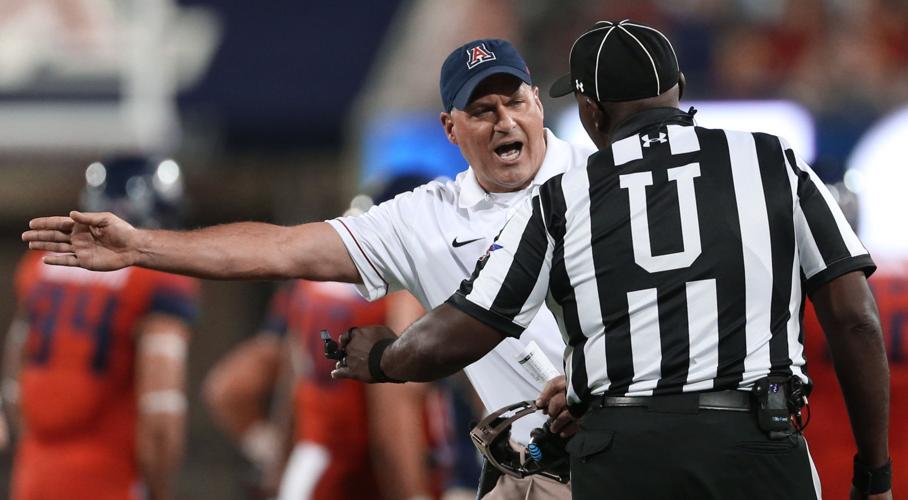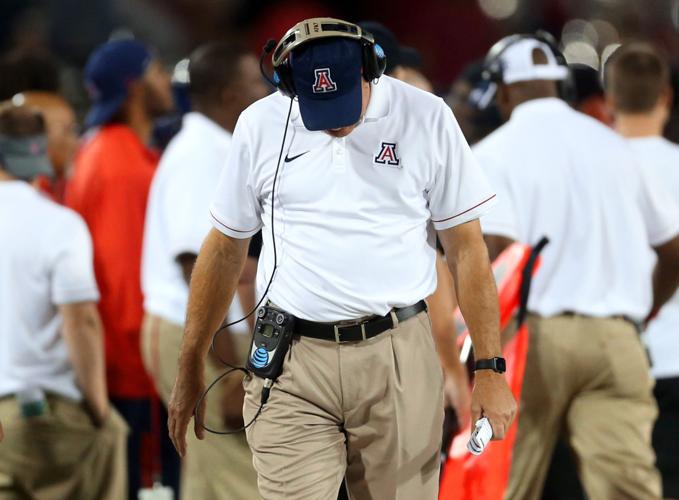Rich Rodriguez has work to do.
The Arizona Wildcats coach has assistants to hire. He has young players to coach. He has challenges unlike any he has faced in his five-plus years at Arizona.
So when Rodriguez greets a visitor in his office Friday with his shoes off and his guard down, rest assured it’s only a temporary respite. Spring practice is scheduled to begin at noon Saturday. It’s the first step in turning around a program that went backward last season.
Rodriguez talked to the Star about the state of the program, the quarterback situation and other key issues heading into spring drills:
When you have a 3-9 season, it ratchets up the pressure. Do you feel that? Do you feel like you’re on the hot seat this season?
A: “That’s a common media term. There’s always pressure. After a bad year, you feel more pressure to win. That’s real. But you can’t let it change the process or who you are or how you go about doing things. Then you start pressing as a coach, and your players start pressing.
“We had pretty good success the first few years. Two years ago was just average. We won the bowl game, but we were average. Last year we were poor. But the things we need to fix we can fix.
“There are certainly some things we need to do as a university, as a program, to stay up with our competition. We’ve got to make a commitment to doing that.
“But we’ve got to worry about what we can control. What we can control, other than injuries, is fixing the things we can fix. I’m confident we’ll get that done by August.”
So bringing in a bunch of transfers to turn things around as quickly as possible to save your job — that’s not your thought process?
A: “No. You’ve got to do what’s best for the program and the university. You always do that. It’s not like we want to win in three years. We want to win yesterday. There’s nobody more competitive than us. We’re not looking to win down the road. We’re looking to win right now. But you’ve got to go with what’s best for the university and what’s best for the program and continue with that process.”
Just about every program has a down year periodically.
A: “It’s going to happen. But going forward, if we do all the things we want to do, it shouldn’t happen again. I’m determined to make sure it doesn’t.”
Going back to the last game of the season, against Arizona State, you guys huddled, which is highly unusual. And it worked well. Did that open your eyes to a different way of doing things, or was it a one-off?
A: “I don’t change the philosophy of who we are based on one game. I think it helped us, because they’re pretty good at knowing your signals and terminology. Did it make the biggest difference in the game? No. I just think we executed better than we had in other games and hit some long plays.
“We’ll change the tempo up. We could probably huddle more. But playing fast, playing uptempo and no-huddle is still going to be the base of our offensive philosophy.”
What are your thoughts on how Brandon Dawkins performed last year and where the quarterback position stands entering spring?
A: “He was competitive and pretty explosive at times in the run game. But — and he would probably be the first one to tell you — he can get better in the pass game and overall as far as the position and all the things that go with it. There’s another level he can get to.
“Competition’s going to help him, whether it’s from guys on the team now or guys we’re looking to bring in. He’s got all the tools to be really, really good. He’s good now when he’s on. But we want him to be really, really good, and I think he does, too.”
Is it Brandon’s job to lose, or is it an open competition between him and Khalil Tate?
A: “It’s an open competition. We kind of always keep it that way. I don’t like anybody to declare, ‘Hey, I’ve got a spot.’ A couple years ago, it was going to be hard for somebody to beat Scooby Wright out of a job. At quarterback, we haven’t had (a player who is) so clear-cut more talented than somebody else — mentally and physically — where nobody can catch him. He (Dawkins) is going to have to earn the job again.”
Anu Solomon left the program in December. Were you surprised to see him leave?
A: “No. I wasn’t really surprised at all when he came and talked to me. I almost anticipated it. He was probably looking for a fresh start somewhere. I don’t know what Baylor’s quarterback situation is. Usually as a graduate transfer, you come in where it’s a pretty open competition. Obviously he feels that’s going to be the case for him there.
“He did some good things while he was here, particularly when he was healthy. It was hard for him to stay healthy, particularly the last couple years.”
You’ve lost three coaches since the end of the season. Is that more turnover than you anticipated?
A: “It’s a little surprising when it happens later, after signing day. But there’s normally some movement there; guys go to the NFL and that opens up spots. Those are good coaches that left, but I also look at it as an opportunity to get some fresh ideas and some new thoughts coming in.”
When that happens, people wonder why these coaches don’t want to be at Arizona. Or is it just the nature of the business?
A: “How many openings have they had at Alabama? People will look at it whichever way they want to look at it. Alabama and some of the top programs have guys that move on. Sometimes they’re getting multi-year contracts or doubling their salaries or (increasing) their responsibilities. I feel good about where our staff is.”
The stats do not indicate that the defense improved last year. Do you still feel like things are headed in the right direction on that side of the ball?
A: “There was some frustration because we wanted to get better right away. But when we got an injury or two, I knew that we would take a hit. We were really going to be hanging on. We took a hit two years ago, too. But last year, some of the deficiencies that we had in recruiting showed up more defensively. And it’s the first year of the system and all that. But I expect a marked improvement, not only in all facets of our defensive stats, but also in the number of players we can play and win with.
“Counting walk-ons, I think in this class there’s maybe 42-44 new players. There were 37 last year. So almost two-thirds of the roster has been turned over in the last year and a half, and it needed to be. People say, ‘How can you be optimistic after a tough year?’ I’m optimistic because I know what we have coming in and what we need to do to get it right going forward.”
Coaching update
Rodriguez said he hopes to have two new assistants in place within the next two weeks but won’t rush the process for the sake of spring practice.
In the meantime, Rodriguez will coach the wide receivers with help from quarterbacks coach Rod Smith. Running backs coach Calvin Magee will add tight ends to his duties in a move that could become permanent (There’s overlap between the two positions, and Magee played tight end in the NFL).
Special teams will be a group effort for now.
Rodriguez has been vetting candidates. He still isn’t sure how he wants to divvy up the assignments with the new hires — i.e., hiring a full-time special-teams coach or having that be part of another assistant’s responsibilities. Slightly complicating matters: Rodriguez said the addition of a 10th assistant to FBS staffs likely won’t happen until 2018.
Extra points
- Arizona will take a cautious approach with running backs J.J. Taylor and Nick Wilson, whose 2016 seasons ended prematurely because of injuries. They will participate, but there’s no need to overwork them, Rodriguez said.
The only player Rodriguez expects to be limited/out all spring is tight end Brion Anduze, who’s still recovering from 2016 knee surgeries.
- Rodriguez said Arizona could add “a couple more” players to the roster in the next month or so via graduate transfer, junior college or late qualifying out of high school.





